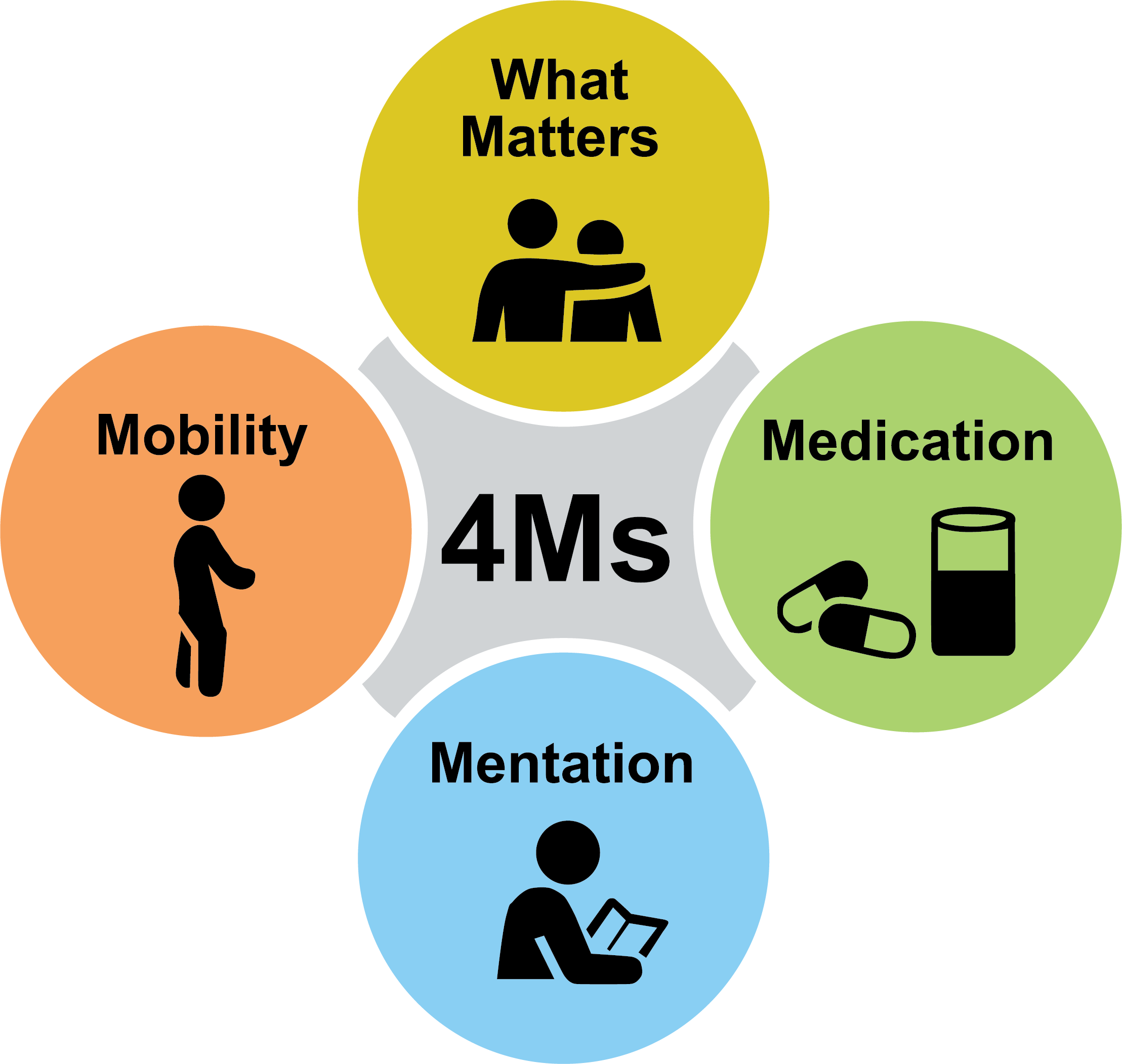Improving care for older adults requires not just transforming the health systems where they receive their care, but empowering older adults themselves to advocate for the care they want and need. If we really support patient-centered care, this means always starting by asking older adults what matters to them. For some, this might be understanding side effects of medications, maintaining independence or keeping active.
Older adults are the experts on their own health needs and priorities, so it is critical that they are supported and encouraged to talk to their providers about what matters to them. It is probably the most important “M” in the 4Ms Framework: What Matters, Medication, Mind and Mobility. The 4Ms Framework was developed by The John A. Hartford Foundation and the Institute for Health Improvement (IHI) as part of their Age-Friendly Health Systems initiative. This framework reflects the four evidence-based elements of high-quality care for older adults.
This movement for better care for older adults has been spreading for years to health systems and, more recently, to primary care providers through the U.S. Health Resources and Services Administration’s funding of Geriatric Workforce Enhancement Programs (GWEPs) across the country. A missing piece in promoting this approach was working directly with older adults and caregivers to learn how they think about the 4Ms and then develop resources to help them proactively interact with their health care team.
To address this need, Community Catalyst’s Center for Consumer Engagement in Health Innovation partnered with Rush University Medical Center’s GWEP, CATCH-ON (Collaborative Action Team training for Community Health – Older adult Network) to engage older adults and family caregivers in co-designing consumer-facing, educational materials on the 4Ms.

The Center, having worked with several GWEPs in the past on consumer engagement, was approached by several additional GWEPs to join in this effort to collaboratively develop and pilot materials on the 4Ms. This was the impetus for the Center’s project on co-designing the 4M materials and is the first-ever effort in the Age-Friendly Health Systems Initiative to talk to older adults directly. In addition to Rush, our partnering GWEPs were: Baylor College of Medicine, Southeast Texas GWEP; BayState Health; Hartford Institute for Geriatric Nursing; and the University of North Carolina. This work was funded through The John A. Hartford Foundation’s grant to the American Geriatrics Society GWEP Coordinating Center
We decided early on that it was important to sit down with older adults and talk about their experience in the health system broadly, before we began discussing the 4Ms. Through working with our partners at Rush, we recruited a diverse population of older adults and family caregivers and conducted focus groups where we listened to their thoughts on what is important to them in their health care. We heard them talk about how important it is for their doctor to really listen to them; how they had concerns about the medications they were on but may not feel comfortable asking about; and how talking about depression among themselves helped them realize they are not alone and it is an important subject to talk about.
Older adults told us in the focus groups that they want to be asked what matters to them, they want to be listened to, and they want to be respected. “I really see how these Ms are all connected,” said one participant. Another shared, “My doctor is very good, clinically - any test in the world, she'll order. I've been seeing her 38 years and she's never asked me if I'm sexually active. You're eliminating a whole part of my life – she’s not seeing me as a whole person.”
Furthermore, we discovered that bringing together a group of older adults to talk among themselves facilitated a common sense of understanding, and that the process itself was empowering, as people shared their stories and were able to learn from one another.
Erin E. Emery-Tiburcio, Ph.D., ABPP and Co-Director of Catch-On at Rush, remarked on the process:
“Creating informational resources that older adults and families will understand and resonate with requires their own voice. So we listened to community voices at every step – from design to dissemination. This kind of patient engagement has been shown to increase agreement on the treatment plan, improve patient satisfaction, and improve health outcomes.”
Our GWEP partners spoke to the urgent need for having the materials available in Spanish, so we created Spanish versions of the brochure and poster. Despite logistical obstacles during the pandemic, we conducted a virtual focus group in Spanish with older adults who are members of the Massachusetts Senior Action Council. Their feedback was crucial, allowing us to ensure the materials were culturally appropriate and relevant for the Spanish-speaking population.
The Center’s ultimate goal with this project was to pilot the 4M materials with GWEPs and their community-based organization partners and begin to conduct educational sessions with older adults and caregivers on how to use the materials to initiate conversations with their providers. With the outbreak of the COVID-19 in early 2020, and the majority of GWEPs and community-based organizations no longer offering in-person services, we digitized the 4M materials so they can be disseminated via emails, newsletters, and other electronic channels.
As we move into the spring and summer of 2021, our hope is that GWEPs and community-based organizations will be able to start distributing the materials to older adults directly. Though getting the materials in the hands of older adults is just the first of many steps, it is a key step in empowering older adults and their caregivers to take control of what matters to them and their health.
